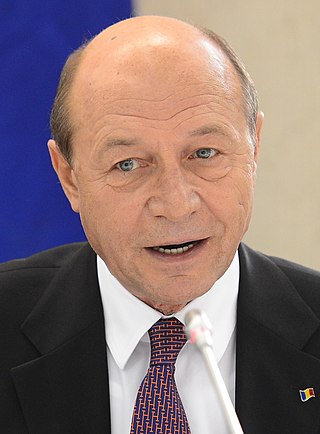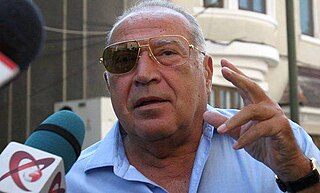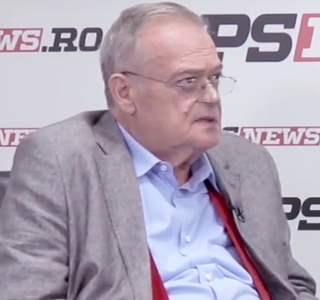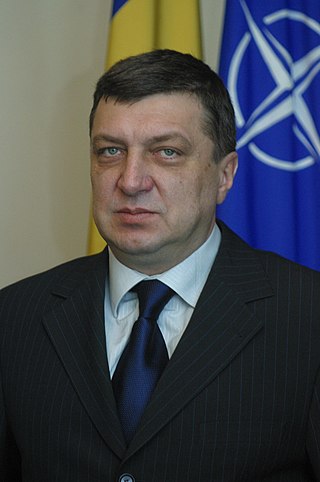Related Research Articles
The mass media in Romania refers to mass media outlets based in Romania. Television, magazines, and newspapers are all operated by both state-owned and for-profit corporations which depend on advertising, subscription, and other sales-related revenues. The Constitution of Romania guarantees freedom of speech. As a country in transition, the Romanian media system is under transformation.
After the Communist rulership ended and the former Communist dictator Nicolae Ceaușescu was executed in the midst of the bloody Romanian Revolution of December 1989, the National Salvation Front (FSN) seized power, led by Ion Iliescu. The FSN transformed itself into a massive political party in short time and overwhelmingly won the general election of May 1990, with Iliescu as president. These first months of 1990 were marked by violent protests and counter-protests, involving most notably the tremendously violent and brutal coal miners of the Jiu Valley which were called by Iliescu himself and the FSN to crush peaceful protesters in the University Square in Bucharest.
Hildegard Carola Puwak was a Romanian politician, a member of the Social Democratic Party (PSD), who served as the Minister for European Integration from 2000 until October 2003. Puwak was of German ethnicity (Swabian) and represented Timiș County in the Chamber of Deputies from 1996 to 2004.

Adrian Năstase is a Romanian jurist, academic/professor, blogger, and former politician who served as the prime minister of Romania from December 2000 to December 2004.

The Social Democratic Party is the largest political party in Romania. It is also the largest social democratic political party in the country. It was founded by Ion Iliescu, Romania's first democratically elected president at the 1990 Romanian general election. It is currently part of the National Coalition for Romania (CNR), which is a big tent grand coalition comprising also the National Liberal Party (PNL). The CNR formerly included the Democratic Alliance of Hungarians in Romania (UDMR/RMDSZ) until mid June 2023.
Evenimentul Zilei is a formerly physical and now exclusively online newspaper in Romania. Its name means "The event of the day".

Traian Băsescu is a Romanian conservative politician who served as the fifth president of Romania from 2004 to 2014. Prior to his presidency, Băsescu served as Romanian Minister of Transport on multiple occasions between 1991 and 2000, and as Mayor of Bucharest from 2000 to 2004. Additionally, he was elected as leader of the Democratic Party (PD) in 2001.

General elections were held in Romania on 28 November 2004, with a second round of the presidential elections on 12 December between former Prime Minister Adrian Năstase of the then ruling Social Democratic Party (PSD) and then incumbent Bucharest Mayor Traian Băsescu of the opposition Justice and Truth Alliance (DA), more specifically of the Democratic Party (PD). Băsescu was elected President by a narrow majority of just 51.2%. The 2004 presidential election was the fifth of its kind held in post-1989 Romania.

Dan Voiculescu, also known as "Varanul", lit. 'the Monitor lizard', or "Felix Voiculescu", is a Romanian politician and businessman. He is the founder and former president of the Romanian Humanist Party (PUR), later renamed the Conservative Party (PC). He was a senator from 2004 until his resignation in 2012.
Adevărul is a Romanian daily newspaper, based in Bucharest. Founded in Iași, in 1871, and reestablished in 1888, in Bucharest, it was the main left-wing press venue to be published during the Romanian Kingdom's existence, adopting an independent pro-democratic position, advocating land reform, and demanding universal suffrage. Under its successive editors Alexandru Beldiman and Constantin Mille, it became noted for its virulent criticism of King Carol I. This stance developed into a republican and socialist agenda, which made Adevărul clash with the Kingdom's authorities on several occasions. As innovative publications which set up several local and international records during the early 20th century, Adevărul and its sister daily Dimineața competed for the top position with the right-wing Universul before and throughout the interwar period. In 1920, Adevărul also began publishing its prestigious cultural supplement, Adevărul Literar și Artistic. By the 1930s, their anti-fascism and the Jewish ethnicity of their new owners made Adevărul and Dimineața the targets of negative campaigns in the far right press, and the antisemitic Octavian Goga cabinet banned both upon obtaining power in 1937. Adevărul was revived by Barbu Brănișteanu after World War II, but was targeted by Communist Romania's censorship apparatus and again closed down in 1951.

Zaman, sometimes stylized as ZAMAN, was a daily newspaper in Turkey. Zaman was a major, high-circulation daily before government seizure on 4 March 2016. It was founded in 1986 and was the first Turkish daily to go online in 1995. It contained national (Turkish), international, business, and other news. It also had many regular columnists covering current affairs, interviews, and a culture section. The newspaper is known for its closeness to Fethullah Gülen, the leader of the Gülen movement. The newspaper originally supported the Justice and Development Party (AKP), but became increasingly critical of that party and its leader, Turkish president and former prime minister Recep Tayyip Erdoğan, particularly after the AKP closed the 2013 December investigation into corruption. On 4 March 2016, in what activists and international media groups criticized as another blow to press freedom in Turkey, control of the newspaper was seized by the government. The takeover was motivated by the newspaper's ties to the Hizmet movement of Turkish cleric Fethullah Gülen, which the government accuses of attempting to establish a parallel state in Turkey.

Monica Luisa Macovei is a Romanian politician, lawyer and former prosecutor, and former Member of the European Parliament from the European Conservatives and Reformists and formerly a member of the Romanian Democratic Liberal Party (PDL). She was the Minister of Justice of Romania in the first cabinet of Prime Minister Călin Popescu-Tăriceanu. In this position she was credited with implementing the justice reforms required for Romania to become a member state of the European Union. Macovei was also an independent candidate in Romania's 2014 presidential elections.
Libertatea is a Romanian daily newspaper and online news website covering current affairs, entertainment, sports and lifestyle. It was founded on December 22, 1989 (12:45 p.m.), by Octavian Andronic, as "the first independent newspaper of the Romanian Revolution of 1989".

Ziua was a major Romanian daily newspaper published in Bucharest. It was published in Romanian, with a fairly sizeable and often informative English section. Ziua was founded in 1994 by Sorin Roșca Stănescu, eventually becoming foreign-owned. It was the most conservative of the major Romanian dailies, often taking a Christian-nationalist point of view in its opinion pieces.

Bogdan Niculescu-Duvăz was a Romanian politician and architect. A member and twice minister of the Democratic Party (PD), he joined the Social Democratic Party in 2003, and was again a minister in 2004. Niculescu-Duvăz was a member of the Chamber of Deputies between 1990 and 2016.

Matei-Agathon Dan was a Romanian economist and politician. A member of the Social Democratic Party (PSD), he was a member of the Romanian Chamber of Deputies for Bacău County from 1992 to 2004. In the Nicolae Văcăroiu cabinet, he was Tourism Minister from 1992 to 1996, and again held that office in the Adrian Năstase cabinet from December 2000 to June 2003, when responsibility for Tourism was assigned to Miron Mitrea.

Marian Sârbu is a Romanian trade unionist and politician. A member of the National Union for the Progress of Romania (UNPR) and formerly of the Social Democratic Party (PSD), he has been a member of the Romanian Chamber of Deputies for Călărași County (1996–2008) and Vaslui County. In the Adrian Năstase cabinet, he was Minister of Labour from 2000 to 2003 Minister-Delegate for Relations with Social Partners from 2003 to 2004. In the Emil Boc cabinet, he once again held the Labour portfolio from 2008 to 2009.

Teodor Atanasiu is a Romanian engineer and politician. A member of the National Liberal Party (PNL), he was Minister of National Defence in the Călin Popescu-Tăriceanu cabinet from December 2004 to October 2006. He was a member of the Romanian Chamber of Deputies for Alba County from 2008 to 2016.

Ovidiu Sincai Social Democratic Institute Foundation is a non-governmental organization from Romania.

There were numerous protests against the Romanian Government between 2017 and 2019. In January 2017, days after the government of the Grindeanu Cabinet was sworn into office in Romania, protests took place throughout the country against ordinance bills that were proposed by the Romanian Ministry of Justice regarding the pardoning of certain committed crimes, and the amendment of the Penal Code of Romania. At the heart of these protests is the community Corruption Kills, founded by Florin Bădiță, who alongside other civic groups organized what proved to be the largest protests since 1989, thus realizing the "Revolution of our generation".
References
- Informaţia, Revista presei în ianuarie 2005 [ permanent dead link ], 14 January 2005
- Cartianu, Grigore et al. Evenimentul Zilei, Domnule Nastase, am aflat noi cine a dat bani presei!, 3 February 2005
- Biroul Roman de Audit al Tirajelor (The Romanian Circulation Audit Office).official industry dataset
